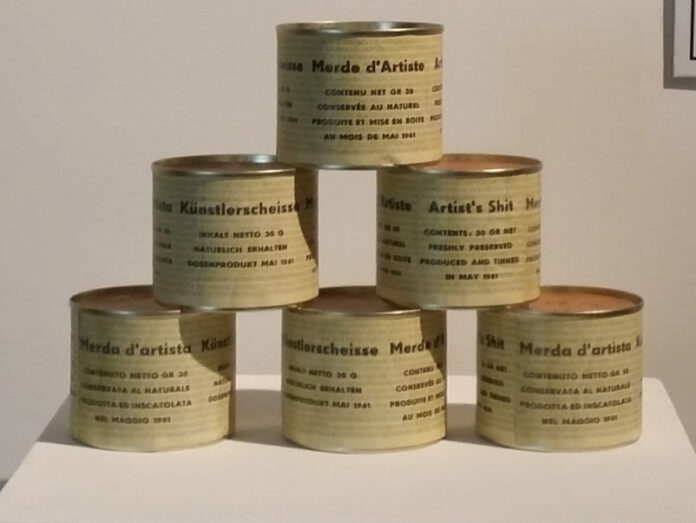Too much art!
The superfetation of art (from fetus and super; do you prefer pollution?) was inevitable: in the closed environment of a few aficionados and even fewer connoisseurs, a plethora of investors rushed onto the scene after the years of the economic boom. They are legions and in the four corners of the earth.
The fall of the communication barriers, the advent of the digital image, the news “in real time” and finally the generalized increase in well-being have determined the race to the vent of one’s creative narcissism.
The right to express oneself creatively cannot be limited. Once poverty prevented many from starting a career. Today you no longer risk anythingto be an artist, on the contrary it is chic. Moreover, there is always a handful of admirers, also because it is just as chic to pretend to understand.
A nation of artists..
In Italy, notoriously home to artists, the number of galleries has grown from about fifty galleries in the 1950s to more than five thousand, if not fifty thousand (the millions of inhabitants are roughly the same). We have all become artists. There is a flowering of the spirit in every district, from the edge of the Brenner to the tip of Canicattì. Before the fifties, artists like Caravaggio, Buonarroti and co, were rare: about ten were born in a century.Today, there are a hundred, thousands, and the Biennials are full of them.
I realize I am repeating myself; I had already written something similar ten years ago, but I have to vent my sickness for Art. Looking at an artwork directly with my eyes, it happens more and more rarely to come across it, I no longer expect the slightest emotion, but at least a breath of curiosity.
Anyway, it is not the fault of my idiosyncrasy for the worldliness with which the events concerning it are promoted and therefore my keeping away from it. The grapevine between serious people still works, the esteem is still authentic and therefore I never move without a compass. However, the meeting is increasingly rare, and the disappointment is on the agenda. Then, we talk about the ivory tower, snobbery, radicalism!
The critic, the one who should do his/her job as a selector, is affected by do-gooders, woe to speak ill of someone: it does not pay and then in a subject where there are no objective parameters it is not worth the candle. Just keep quiet, let the facts speak for themselves, and it is well known that finance has determined them for some time.
Do or do not..
So, what do we do? All corrupted, all interested? I do not support this. On the contrary, the artists should react first. And what is the formula?
It is simple! Do not produce anything (the verb is ambiguous, too compromised with the economy of work), do it only when you really cannot live without it and above all for yourself. Stay listlessly on the sidelines, well aware that none of our presumptuous poop nothing is useful to anybody. But above all if (we are in the hands of God, a capricious God at least as much as humanity who believes in him), we do it anyway, we do it for a future that none of those present producers and consumers, will see.
Sic transit gloria mundi.
Nausea d’artista
Troppa arte!
La superfetazione dell’arte (da feto e super; preferite polluzione?). Era inevitabile: nell’ambiente chiuso di pochi affezionati e ancora meno di intenditori, dopo gli anni del boom economico si è precipitata sulla scena una pletora di investitori. Sono legioni e ai quattro angoli della terra.
La caduta delle barriere di comunicazione, l’avvento dell’immagine digitale, la notizia “in tempo reale” (mi vergogno a usare questo termine di cui non capisco fino in fondo il significato) e l’aumento generalizzato del benessere hanno determinato la corsa allo sfogo del proprio narcisismo creativo.
Il diritto di esprimersi creativamente non può essere limitato. Una volta la povertà frenava molti dall’intraprendere la carriera, oggi a far l’artista non si rischia più niente, anzi è chic. E poi un pugno di ammiratori si trova sempre, anche perché fa altrettanto chic fingere di intendersene.
Un popolo di artisti..
In Italia, notoriamente patria di artisti, da una cinquantina di gallerie negli anni cinquanta del secolo scorso si è passati a più di cinquemila, se non cinquantamila (i milioni di abitanti sono press’a poco gli stessi). Siamo diventati tutti artisti, c’è un fiorire dello spirito in ogni contrada, dall’estremo del Brennero alla punta di Canicattì. Prima degli anni cinquanta di Caravaggio, Buonarroti e co. ne nascevano una decina in un secolo, oggi sono centinaia, migliaia, le Biennali ne son piene.
Mi rendo conto di ripetermi; già dieci anni fa avevo scritto qualcosa di simile, ma devo sfogare la mia nausea per l’Arte. Di fronte a un’opera diretta ai miei occhi mi succede sempre più raramente di imbattermi, di ricevere da lei, non pretendo una minima emozione, ma anche solo un afflato di curiosità.
E non è colpa della mia idiosincrasia per la mondanità con cui si promuovono le manifestazioni che la riguardano e quindi il mio tenermene lontano: il tamtam fra gente seria funziona ancora, la stima è ancora autentica e quindi non mi sposto mai senza bussola. Ma l’incontro è sempre più raro e la delusione all’ordine del giorno. Poi si parla di torre d’avorio, di snobismo, di radicalità!
Il critico, colui che dovrebbe fare il proprio mestiere di selezionatore, è affetto da buonismo, guai parlar male di qualcuno: non rende e poi in una materia in cui non esistono parametri oggettivi non vale la candela. Basta tacere, lasciar parlare i fatti, ed è notorio che da un po’ di tempo questi li determina la finanza.
Fare o non fare…
Allora come la mettiamo? Tutti corrotti, Tutti interessati? Non sostengo questo, ma che i primi a dover reagire sono proprio gli artisti. E qual è la formula?
Ma è semplice! Non produrre niente (il verbo è ambiguo, troppo compromesso con l’economia del lavoro), farlo solo quando proprio non se ne può fare a meno e soprattutto per se stessi. Svogliatamente, stare ai margini, ben coscienti che delle nostre “cacchette” presuntuose nessuno se ne fa un bel niente e che, se mai (siamo nelle mani di Dio, un Dio capriccioso almeno quanto l’umanità che crede in Lui),lo facciamo per un futuro che nessuno dei presenti, produttori e consumatori, vedrà.
Sic transit gloria mundi.








